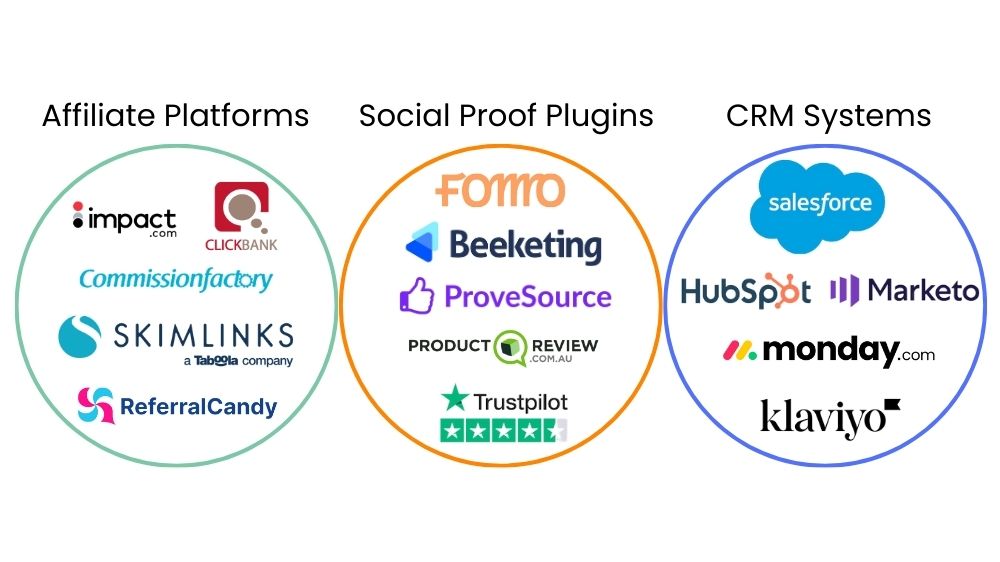How to Use E-Commerce Partnership Tools to Target New Audiences
Category partnerships

Posted by Wei T.
Growth Marketing Expert

Introduction
Welcome to another insightful post here on CrossyShop, where we strive to provide you with actionable insights to propel your e-commerce business. Today, we are diving into the riveting world of e-commerce partnerships and exploring how they can help you target new audiences.
The e-commerce landscape is ever-changing, and to keep up with the competition, you must continuously evolve. One effective strategy to stay ahead is by forming meaningful partnerships to tap into new customer segments.
This blog post will serve as a comprehensive guide on using various e-commerce partnership tools to unlock fresh customer bases. If you're interested in exponentially growing your online business, keep reading!
The Landscape of E-Commerce Partnerships
What Are E-Commerce Partnerships?
E-commerce partnerships refer to the collaborative efforts between your online store and another business or influencer. These partnerships are designed to provide mutual benefits, such as increased exposure, shared resources, and boosted sales.
To get a more in-depth understanding, you can read our previous post on Business Partnerships: The Power of Collaboration.
Types of E-Commerce Partnerships

The variety in e-commerce partnerships can be quite overwhelming. Here's a list to help you navigate:
- Affiliate Partnerships: Partner with bloggers and content creators who will promote your products in exchange for a commission.
- Influencer Partnerships: Team up with social media influencers to expose your brand to their followers.
- B2B Partnerships: Form alliances with other businesses for cross-promotions or joint ventures.
- Technology Partnerships: Partner with tech companies to integrate their services or features into your online store.
To delve into each type in detail, check out our comprehensive guide on Online Partnership Marketing.
| Type of Partnership | Key Benefits | Best For |
|---|---|---|
| Affiliate Partnerships | Commission-based income, Wider audience reach | New and established businesses |
| Influencer Partnerships | Brand exposure, High engagement rates | Businesses targeting younger demographics |
| B2B Partnerships | Shared resources, Bigger project scope | Businesses with complementary services |
| Technology Partnerships | Enhanced features, Better customer experience | Tech-savvy e-commerce stores |
Why Target New Audiences?
Targeting new audiences isn't just an option; it's a necessity for any growing e-commerce business. The digital marketplace is saturated, and relying solely on your existing customer base won't cut it for long-term success.
New audiences bring fresh perspectives, diverse needs, and untapped revenue streams that can give your business the boost it needs.
Metrics to Consider
Before diving into the partnerships, it's crucial to understand some key metrics that will help you measure the effectiveness of your strategies:
- Customer Acquisition Cost (CAC): The cost incurred to acquire a new customer.
- Customer Lifetime Value (CLV): The total value a customer brings to your business over their lifetime.
- Conversion Rate: The percentage of visitors who take the desired action, such as making a purchase.
For a deep dive into how these metrics can influence your strategies and how to promote your online store effectively, read our post on Cost-Efficient Methods for Promoting Online Store.
Tools for E-Commerce Partnerships
There's a plethora of tools available that can effectively manage and streamline your e-commerce partnerships. Here's a rundown:

Types of Tools
- Affiliate Platforms: Software that helps you manage affiliate partnerships, track sales, and distribute commissions.
- Social Proof Plugins: These plugins display reviews, testimonials, or recent purchases to build trust among visitors.
- CRM Systems: Customer Relationship Management systems help in managing leads, customer interactions, and data to strengthen B2B partnerships.
To make the most of these tools, we've crafted an in-depth guide to help you. Don't miss our article on E-Commerce Partnership Tools to Boost Sales.
Quick Comparison Table
| Type of Tool | Primary Function | Impact on Partnerships |
|---|---|---|
| Affiliate Platforms | Commission tracking & management | Facilitates affiliate partnerships |
| Social Proof Plugins | Display reviews & testimonials | Builds trust; increases conversions |
| CRM Systems | Manage customer data and interactions | Streamlines B2B relationships |
How to Implement Tools Effectively
Implementing e-commerce partnership tools is not a set-it-and-forget-it task. For maximum efficacy, these tools need to be deployed and managed strategically. Here are some practical steps:
Steps to Implement Tools
- Identify Needs: Assess your current business model and customer base to determine which tools would add the most value.
- Research & Compare: Look for tools that best suit your needs and compare their features, pricing, and reviews.
- Pilot Testing: Start with a smaller audience to evaluate performance and ease of use.
- Training: Train your team on how to use these tools effectively.
- Monitoring & Analytics: Regularly check the tool's analytics to evaluate its impact on your KPIs.
Overcoming Challenges
- Budget Constraints: Look for tools with freemium models or ones that offer a free trial.
- Lack of Expertise: Utilize online tutorials or hire a consultant for a deeper understanding of the tools.
- Data Privacy Concerns: Ensure that the tools are GDPR compliant or have robust security measures.
For more tips on overcoming potential obstacles, see our post: Overcome E-Commerce Partnership Challenges.
Upselling and Cross-Selling Through Partnerships
Another incredible benefit of forming e-commerce partnerships is the opportunity for upselling and cross-selling. These strategies can dramatically increase your Average Order Value (AOV) and boost your revenue.
Strategies to Consider
- Product Bundling: Team up with a partner to sell complementary products as a bundle.
- Exclusive Offers: Create exclusive offers that can only be accessed through your partner's platform.
- Time-Limited Promotions: Use the sense of urgency to encourage additional purchases.
To kick-start these strategies with automation, don't miss our article on Automated Cross-Selling to Boost Sales. For a general understanding of the techniques and their effectiveness, read Upselling and Cross-Selling.
Strategy Comparison Table
| Strategy | Potential Impact | Best Used When |
|---|---|---|
| Product Bundling | Increases AOV; provides value | You have complementary products |
| Exclusive Offers | Creates exclusivity; boosts sales | You have a high-engagement partner |
| Time-Limited Promotions | Urges quick action; increases sales | Running seasonal or event-based promos |
Trends and Future Predictions
As the e-commerce landscape evolves, partnerships continue to be a driving force behind successful online businesses. From Artificial Intelligence-guided personalization to integrating with Virtual Reality platforms, the future looks promising.
Current Trends
- Data-Driven Partnerships: Businesses are increasingly relying on data analytics for decision-making.
- Sustainability: Partnerships focusing on sustainable practices are gaining traction.
- Blockchain: Utilizing blockchain for transparent and secure transactions between partners.
For a closer look at where the industry is headed, read our post: Trends in E-Commerce Partnership Marketing.
Conclusion
In summary, e-commerce partnerships are a strategic way to target new audiences and unlock growth. By understanding the types of partnerships, utilizing the right tools, and implementing effective strategies like upselling and cross-selling, you can position your business for success.
Now that you are armed with this knowledge, the next step is to take action. Whether you're looking to establish your first partnership or optimize your existing ones, don't miss out on the potential to elevate your business to new heights.
If you have any further questions or would like to explore partnership opportunities with CrossyShop, feel free to reach out to us.